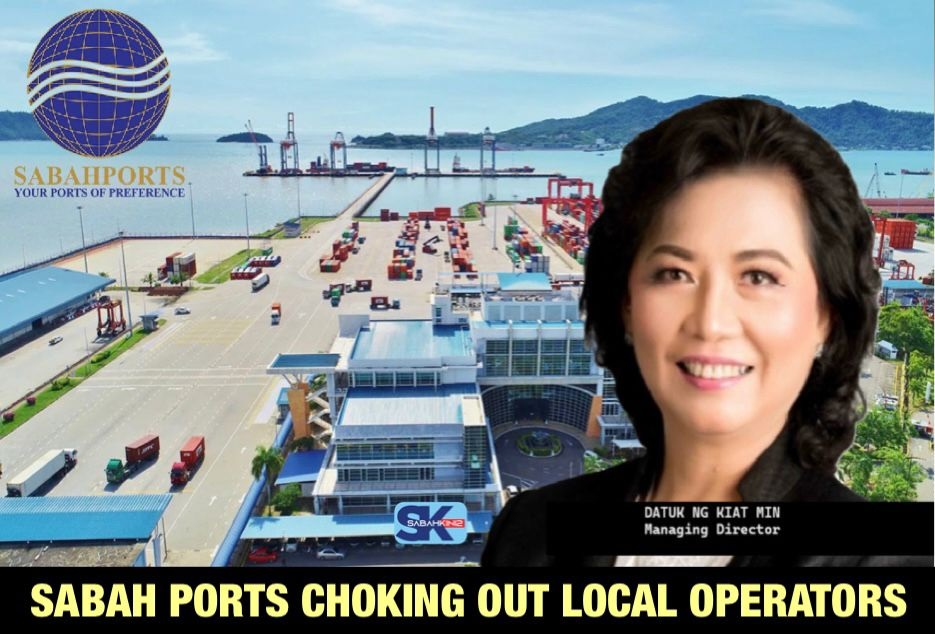According to sources, Sabah’s Port Authority & Logistics Operators are facing an internal storm brewing.
“It is getting worse by the day, and every attempt to talk to the (Sabah) Port Authorities has been met with excuse after excuse after excuse – let’s make this clear, it is not some big policy issue at the port, it is the decades old accumulation of multiple small problems in operation and even the basic quality of service that have compounded and become bigger issues today” as was claimed from a source close to the Sabah Ports industry.
This was just one of a few claims shared from sources who work with the Sabah Port Authority (Sabah Ports Sdn Bhd) who shared the frustration of working in the industry, the on-going inefficiencies that have led to heavy losses and threats of closure for many Sabahan operators in the logistics industry who rely on Sabah’s ports to provide logistic services for customers.
“Many if not most of us (In the industry) have to deal with the delays and explanations to our customers – ships are arriving in our waters, and they are not able to berth and off-load cargo until 5, maybe even 7 days later – this would never happen in any other port across Malaysia or even internationally, without a good reason”
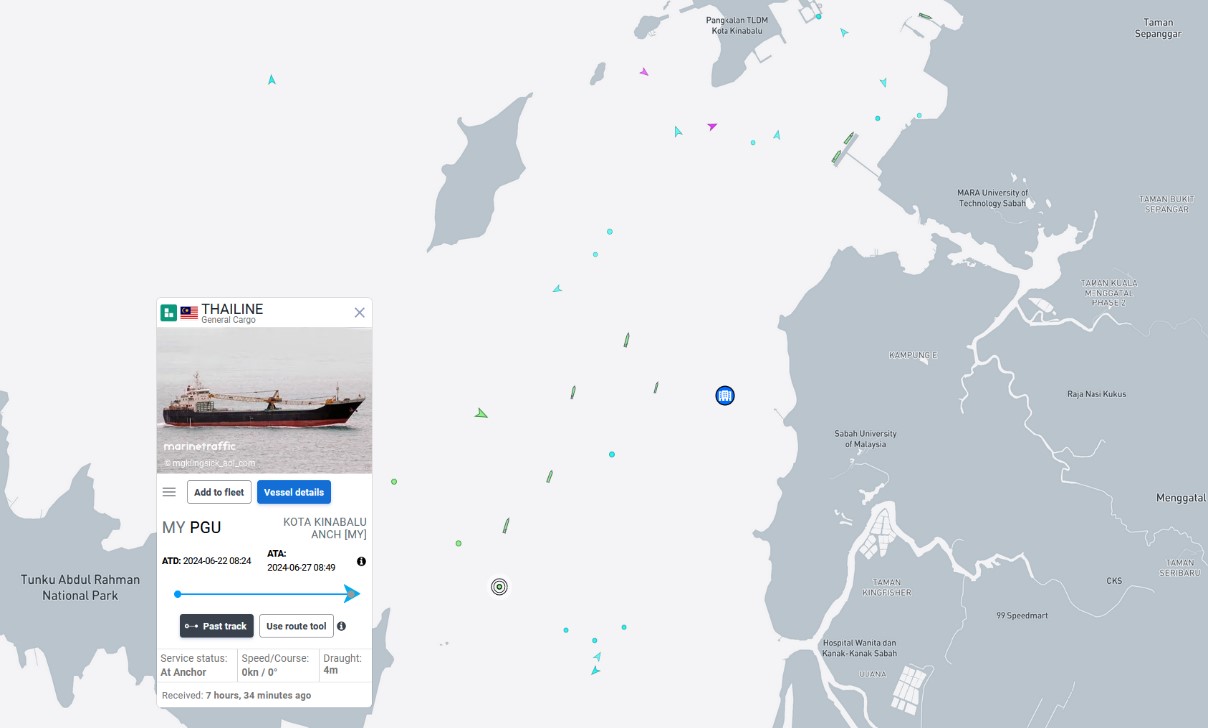
Checks on the ship movement database on the 4th of July via MarineTraffic.com provided insight to the on-going real-time problem that showed, almost 7 container vessels waiting to berth at the Sepanggar Bay Port, and 2 conventional vessels waiting to berth at KK Port. One vessel, the Malaysian Vessel “Thailine”, a General Cargo Vessel, had arrived in Sabah on the 27th of June, and almost 8 days later, the vessel was still waiting in line to berth at Sepanggar Port, burning fuel in the Tunku Abdul Rahman National Park’s blue economy zone, spending money to feed its crew and most concerningly, unsure if its cargo was of a perishable or expirable nature.

Checks on the morning of the 5th of July via MarineTraffic.com revealed the Thailine had been moored at Sepanggar Port, 9 days after its arrival in Sabah and 12 days after it’s departure – It takes roughly 2 days for Vessels departing from Port Klang to arrive in Sabah.
Interestingly, out of the 5 Berths claimed accessible by Sabah Ports website, only 2 are in operation at the Sepanggar Bay at check.
It is suspected that the reason why 2 berths are used generally is due to possible out-dated design of the berthing wharf that doesn’t cater to larger or more modern vessels from being able to utilize the space.
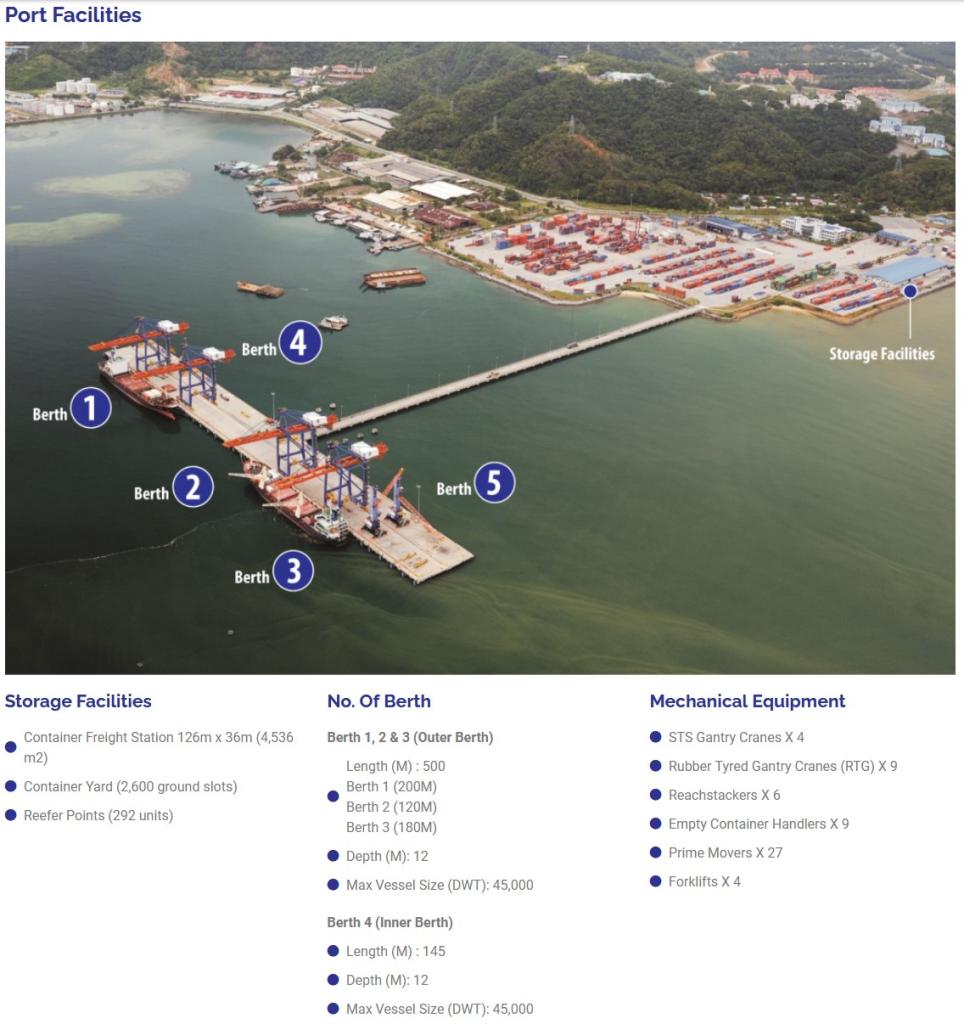
However, there is a growing trend globally of congestion at ports. On the 26th of June 2024, Reuters reported that Singapore Port was facing severe congestion in recent weeks, with wait times expected to reach even a week time possibly. Normally, the berthing period is 1 day, and the average wait time is between 2-3 days. However, the reality is Sabah Ports is not even remotely close to the standard of an international trade zone like Singapore Ports. Due to Singapore Ports announcement of longer wait times, many transporters are considering moving their vessels to other ports, leading to growing fears that delays are not in the interest of any functioning port, in the long run – this is a situation that Sabah should be watching closely on.
“The delays in Sabah are already so bad, international vessels are already considering to bypass Sabah Ports, especially those carrying perishable goods (Like raw supplies from India), we are told by the international operators to instead figure out transportation through Port Klang instead of being a direct delivery” claimed the source.
“Half the industry is tired and frustrated having to deal with the excuses that the Sabah Ports will be operating better in the future...when is that future? Whilst the other half, have no choice but to rely purely at the mercy of the port operating efficiently – before, there was a culture that any protest against the port is met with threat that you will be sidelined, however in more recent times it has gotten better, but some operators still fear that this culture will reappear again” mentioned the source.
The sideline reference is that the Sabah Port office allegedly used to practice that they would simply not entertain requests for documentation submission or choose to prioritize other operators over those it deems “undesirable” or “trouble-makers” according to the source, despite the global push towards impartial digitization - many if not most of the current procedures at Sabah Port is done under out-dated practices, such as physical documentation submissions for manifests over counters or even auto-gating for permitted users is currently done manually.
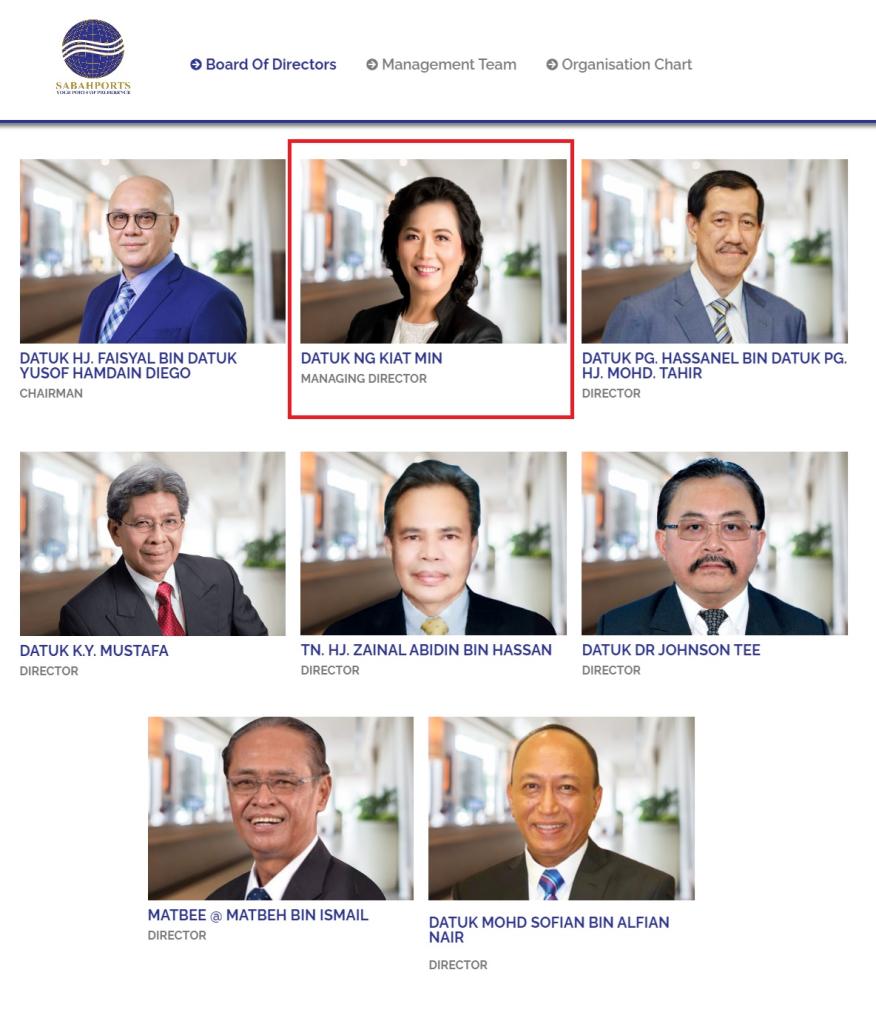
Board of Directors Sabah Ports
The source described that the types of protests most commonly happen from industry operators due to congestion in the port, leading to even basic ground logistics having to wait up to several hours to move anywhere in or out of the port. The source mentioned that generally, the port workers on the ground would try their best to move traffic along and get the port moving, but sometimes it feels that simply not enough is done to tackle the problem in the long run.
“There just doesn’t feel like the port authorities at an upper-level have any sense of urgency or movement, whilst we as operators incur losses waiting for servicing from the port – the logistics industry is purely driven by efficiency and time, and delays are bad for business and ultimately, the customer picks up the bill – how to Sabah Maju Jaya like that?”
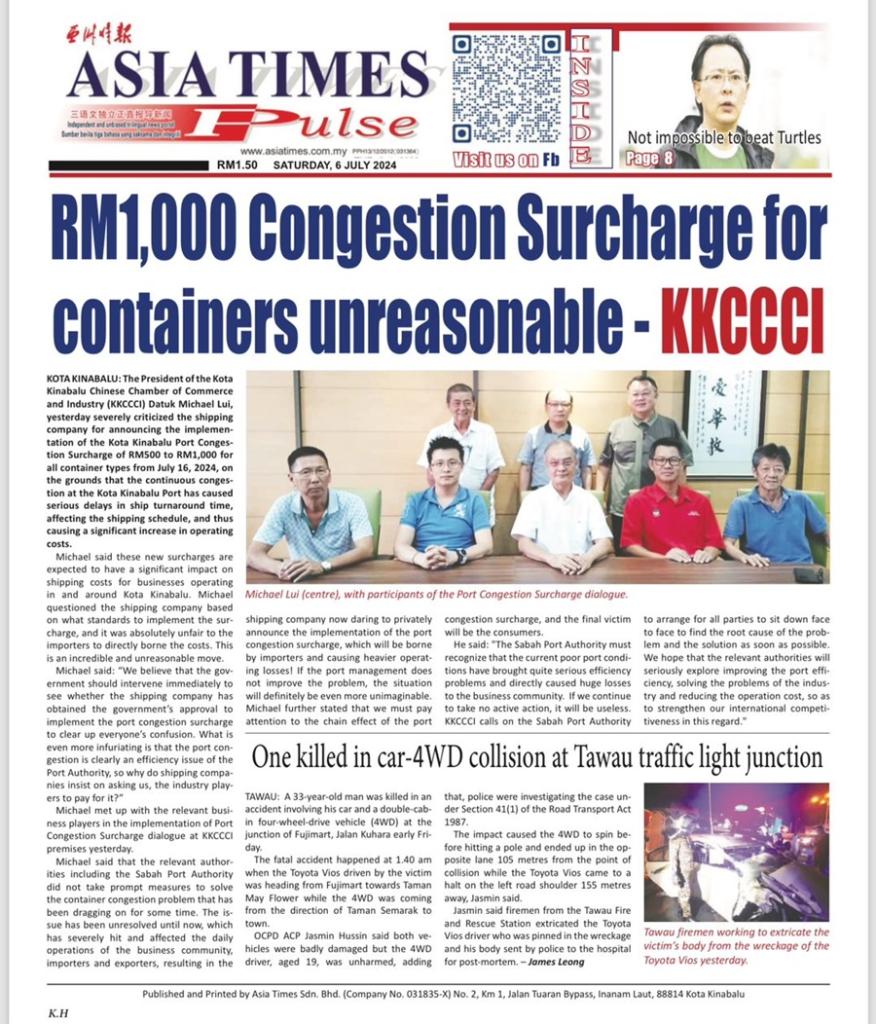
UPDATE
Persatuan Pengusaha Lori Kontena Kota Kinabalu (PPLKKK) expressed its dismay at the implementation of congestion surcharge by liners at Kota Kinabalu port. Shipping Lines just unilaterally imposed this surcharge, and seems to be enjoying an exception under the competition laws, and we are therefore at their mercy. Sabahans are suffering from high cost of living and this will make it worst. The newly formed Sabah Logistics Council should act fast and also find a way to regulate fees charged by shipping lines into Sabah. The authorities too should examine and expedite the port expansion without further delay.
At the same time, Sabah Ports Sdn Bhd (SPSB) too should relook at their management of Sapangar Bay Container Port (SBCP). The expansion of SBCP mooted more than 7-8 years ago is still to be seen. The port is just unable to cope and with lack of space, equipments and manpower, receiving and delivery was just not satisfactory. They urged port users to take delivery of laden as soon as possible but their truck turnaround time is making hauliers wait longer than expected. Hauliers wanted to do more trip in a day but with their failure, we just cannot meet our target. Equipment breakdown, slow change of shift, shortage of workers and lack of monitoring by the senior management contributed to it.
Receiving of containers too is at the receiving end of their lack of space. Laden or empties are not allowed into the port earlier and are being given only a mere 2 or 3 days to deliver hundreds of containers for a particular vessel. And in the other way around, they impose penalty charges if containers are delivered into the port late, after a time given by them.
We understand SPSB management is doing their best to solve the issue, but this problem has persisted far too long.
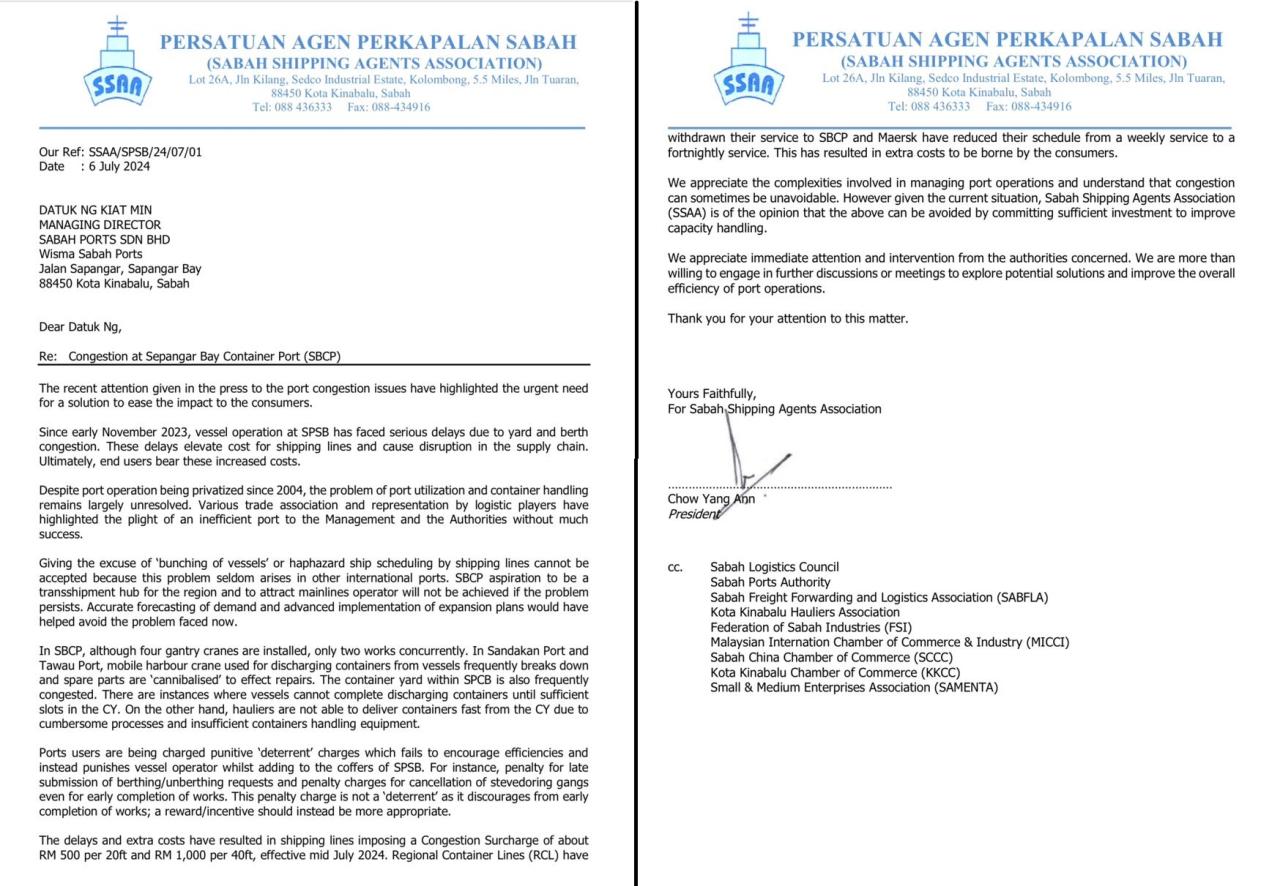
We also call upon importers to also consider receiving their containers after working hours, Sunday or public holidays. This will help ease the congestion at the port. Of course, this create another question, why and when is SBCP going to be gazetted as 24 hours 7 days a week port by Customs (KDRM) instead of a 8-5 and 5 days week port ? The change will greatly help in the passing of papers with Customs and do away with having to request for overtime. Is this congestion not enough to prove that we need to be gazetted as a 24 hour port? Can the authorities concerned expedite it?

 6
6 